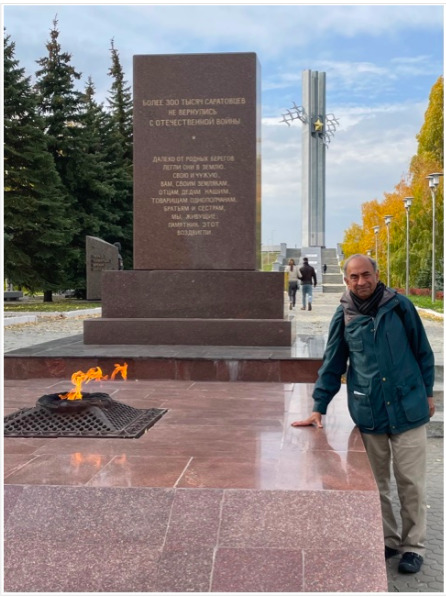Dear CCI Friends,
Two CCI travelers from our 2019 trip, Dennis Ortblad and Krishen Mehta, visited Russia recently to experience not only Moscow, but also some cities along the Volga River, including Kazan, Saratov, and Samara. They were deeply moved by the memorials to the Great Patriotic War from 1941 to 1945 that they saw in almost every city that they visited. As we know, there was no city that was left untouched by the tragedy that befell Soviet Russia during that period. Below is a brief article that one of the travelers, Krishen Mehta, wrote after his visit to the memorial in Saratov.

Sharon Tennison
Center for Citizen Initiatives
American Committee for US-Russia Accord

October 18, 2021
By Krishen Mehta
Late last week I paid a very moving visit to a memorial in Saratov, Russia in honor of Russia’s sacrifices in WWII. I paid my respects at the eternal flame honoring the sacrifices made by the soldiers who fought Russia’s battles from 1941 to 1945, and saw an evocative sculpture depicting the fallen soldiers as cranes going up in the sky.
The Russian poet, Rasul Gamzatov, wrote a poem called “Zhuravli” to honor the soldiers.
The poem starts with the lines:
“I sometimes feel that the soldiers
Who have not returned from the bloody fields
Never lay down to earth
But turned into white cranes…
”The poem is a small but fitting honor to the millions of Soviet soldiers who lost their lives, in order that the West could prevail in World War II. This sacrifice has seldom been acknowledged or fully understood by the West.
I realize also that many in the West believe that the Molotov-Ribbentrop pact was the start of World War II. But something that many students of history do not recognize that in the 1930’s, the Soviet Union tried to stop the attacks by Nazi Germany on either the East or the West by negotiating a pact with Britain and France so that Hitler would be prevented from attacking either Poland, France, or Russia.
Stalin’s argument was that if the allies were united against Germany on both East and West, then Hitler would be constrained from attacking on either side. Britain and France both turned down Stalin, and would not sign such an agreement with him. They thought that in refusing to do so, Hitler would be less constrained to attack in the East rather than in the West. That was what Britain and France wanted, or certainly hoped would happen.
There was also a strong anti-communist stance in both Britain and France, and they did not want a pact with the communist government in the Soviet Union. Perhaps they thought that Hitler would attack the Soviet Union and ‘finish the job’ for them, something that they could not do at the onset of the Bolshevik Revolution.
Some argue Stalin chose the only option that was open to him: To sign a pact with Nazi Germany to buy himself time before Hitler inevitably turned his attention to the East. After the Molotov-Ribbentrop pact was signed, Hitler turned his attention initially to the West, conquering most of the countries in Western Europe, before turning to the East. During that time, it should be recognized, Stalin’s Soviet Union did take part in the dismemberment of Poland and re-annexed the Baltics states which had achieved independence from the Russian empire after World War I. Eventually, of course, only after Hitler invaded Soviet-occupied territory in Eastern Europe on June 22, 1941, did the Soviets join the allies in the war against Nazi Germany. And the allies did eventually prevail, with the cost to Russia of over 26 million lives.
*********************
The full translation of the poem “Zhuravli” is below:
CRANES
Sometimes I feel that all those fallen soldiers,Who never left the bloody battle zones,Have not been buried to decay and molder,But turned into white cranes that softly groan.
And thus, until these days since those bygone times,They still fly in the skies and gently cry.Isn’t it why we often hear those bell chimesAnd calmly freeze while looking in the sky?
A tired flock of cranes still flies – their wings flap.Birds glide into the twilight, roaming free.In their formation I can see a small gap –It might be so, that space is meant for me.
The day shall come, when in a mist of ashenI’ll soar with cranes, and final rest I’ll find,From the skies calling – in a bird-like fashion –All those of you who I’ll have left behind.
Sometimes I feel that all those fallen soldiers,Who never left the bloody battle zones,Have not been buried to decay and molderBut turned into white cranes that softly groan…
